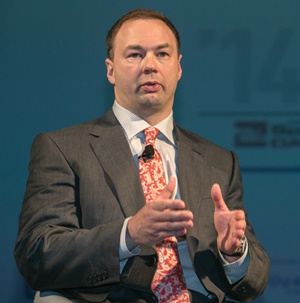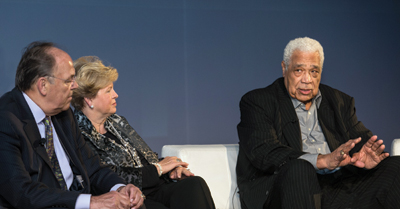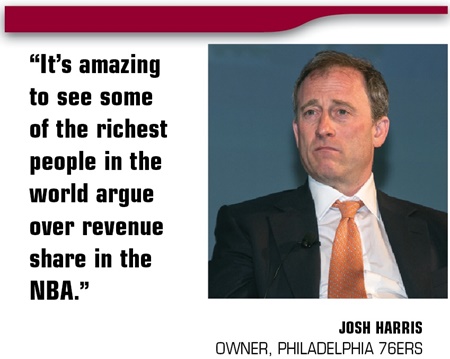Among the thoughts and comments that stood out to me at the recent World Congress of Sports in Dana Point, Calif.:
> MOVING PICTURES: Legendary Entertainment CEO and Pittsburgh Steelers minority partner Thomas Tull connected the dots between sports and Hollywood when he talked about bringing data analytics to his entertainment business. He recently purchased software analysis company StratBridge, which has worked for years with dozens of sports teams. He believes the company’s expertise will add efficiency in targeting film audiences, where marketing costs can exceed $120 million around major releases. He called such spending misguided when it could be far more targeted and said StratBridge will give him an advantage because Hollywood hasn’t used big data to its advantage the way sports has. “People are willing to put their lives, their likes, their dislikes, their social conversations online in a way that you can take a look at,” he said. “For us, it’s about not targeting people who have absolutely no interest in our product. It’s about taking people who are persuadable — that if they had the information and you engage with them in a way that’s compelling to them — they would want to buy the movie ticket, go to the game, whatever it is that you’re selling.”
 |
|
Legendary Entertainment’s Thomas Tull said the purchase of analytics firm StratBridge gives him an advantage in Hollywood.
Photo by: TONY FLOREZ PHOTOGRAPHY
|
Tull’s low-key, humble demeanor — raised in upstate New York, a former baseball scout made good — played well with the audience. “I’m literally the luckiest guy on the planet, because when I was a kid I was a movie geek,” he said. “I loved Batman, Superman and Godzilla, and, it turns out, I get to make [a movie on each of those characters], which is crazy. And the Steelers … I don’t know where the leprechaun is, or whatever, but it’s been a pretty crazy ride.”
> SPORT MOST BUZZED ABOUT: You’ve heard it before, but soccer drew plenty of buzz over the two days, most noticeably for its youthful demos. In one session, both Peter McLoughlin (who oversaw the Seattle Sounders until earlier this month) and Toronto FC’s Tim Leiweke pointed to their clubs’ younger fan base compared to those of their other franchises. On another panel, Yahoo Sports’ Ken Fuchs noted the growth of younger demos around soccer for his business: “We look at soccer, and it’s the second biggest fan sport … among 12- to 24-year-olds [for site users]. It’s just behind the NFL and ahead of NBA and MLB. Here is a game that is about as simplistic as you can get. I have an 8-year-old son and I sit there having to explain all the rules of baseball and technical rules of football. Soccer is so simple. … The simplicity of that is a draw.” Later, in presenting an IMG Fan Engagement Study from March 2014, Catalyst PR’s Bret Werner noted that MLS and NBA fans were the “most digitally connected,” with heavy use of platforms Facebook, YouTube, Twitter and Google Plus, and stronger numbers than other leagues around Instagram.
> ARE YOU READY FOR THE COUNTRY? OR RIO?: In a panel on preparations for the Rio World Cup, Ernesto Bruce, Adidas North America director of soccer, was blunt when he talked about the hospitality challenges presented by the location. “We tell our clients, you may get stuck on a bus for two hours getting around the city. We also tell them don’t expect the Ritz-Carlton,” he said.
> DUNCAN TIME: U.S. Secretary of Education Arne Duncan was outspoken, with a couple of remarks that may have raised a few eyebrows from the sports audience. First, he shared sobering anecdotes and statistics about how other countries are working harder at child education than the United States. Second, he challenged teams and leagues to move beyond window dressing when it comes to education programs.
“What I frankly am going to challenge people to do is to get beyond the one-offs, to get beyond the photo ops and to get beyond the few tickets for a few kids and the autograph sessions,” Duncan said. “Those are all nice, but for me, that’s not meaningful change.” He outlined deeper examples of engagement around after-school programs and community groups that help schools. Finally, he called out the NCAA for not penalizing college coaches — instead, penalizing the institutions — when it comes to infractions. “The idea that penalties don’t get attached to coaches instead of institutions makes no sense to me,” he said. “The fact that a coach can run a program in the ground, and then leave and double his salary at the next institution — and the university he left is decimated and loses scholarships: If I commit a crime, my wife shouldn’t pay for it and the person next to me shouldn’t pay for it; I should pay for it.”
> LONG MAY YOU RUN: It’s clear the Phoenix Coyotes have a long way to go for economic stability, and I’m not thoroughly convinced the NHL will have long-term viability in Glendale, Ariz. But the team’s new owners have made strides on the business side, and have up-sold certain sponsorship categories. Daryl Jones, general partner of Ice Arizona and team co-owner, said: “We can probably get to break-even in the next couple of years, which is a big route for a franchise that had been losing $30 million plus per year.”
> WE CAN SHARE WHAT WE’VE GOT OF YOURS: Josh Harris has owned the Philadelphia 76ers for 2 1/2 years and he is likely one of the wealthier owners in the league. One issue about team ownership has stood out to him: revenue sharing. “It’s amazing to see some of the richest people in the world argue over revenue share in the NBA,” Harris said during a panel of new team owners. “I won’t name names. There are so many issues that come up that if the league can get the ownership groups to take off their individual city hats and team hats [it can improve the game]. … The league does a very good job in focusing the ownership group on the greater good, whether that be sponsorship deals, media contracts or tricky issues like revenue share. … You can’t have a league [of] five big-market teams. You need to work out how the small-market teams are going to be able to survive. That’s a tricky issue.”
> THE ONLY CONSTANT I AM SURE OF …: Having trouble keeping up with the accelerating pace of change? No one capsulized this better than Callaway’s Harry Arnett, who spoke about the frustratingly fast pace of distribution changes and how that makes his brand focus on creative messaging first. “The more that you invest in something you think is going to have a year or two life cycle for younger demos, the more you realize it’s going to have a one-week life cycle,” he said. “It’s really following the consumption habits of hippies back 35 years ago. So what Callaway has done is invest more in an ability to communicate to them from the creative side knowing that dissemination of that content is likely to change daily.”
> TRANSITION GAME: News that Phil Jackson has joined the New York Knicks could remove some of the distracting noise around leadership of the Los Angeles Lakers. While the Lakers have come under some criticism over fissures in management between Jeanie Buss and her brother Jim, NBA Commissioner Adam Silver called it a symptom of an organization in transition. He noted he spent time with team Governor Jeanie Buss prior to World Congress, and when pressed about the state of the franchise, he got fired up. “Give her a break,” he stressed. “I would just say there has been a transition from her father, who was one of the greatest owners … in modern sports history. Jeanie grew up in the business, she knows it as well as anyone. I think in some ways, her job may be made a little bit easier in terms of some finality with Phil. I think that was always hanging out there, because of her and Phil’s relationships. Was Phil going to step into the organization? I think the fact that there is clarity now with Phil joining the Knicks will make it easier for Jeanie to do her job. And I have enormous confidence in her, and her brother, who is running the basketball side, and her whole family.”
 |
|
Bill Schmidt, Joan Cronan and Wayne Embry share their stories at the Champions panel.
Photo by: TONY FLOREZ PHOTOGRAPHY
|
> LOOSE BALLS: One of my favorite sessions of any event we do is our Champions discussion at the World Congress, and this year’s session didn’t disappoint. The heartfelt humility of those being recognized resonates, and their stories and dedication to their craft truly move the audience. Hearing stories like
Bill Schmidt’s pursuit of
Michael Jordan,
Joan Cronan’s long partnership with
Pat Summitt, and
Wayne Embry’s battles against hate-filled racism and death threats are stories that stick with you. … A great deal of talk, questions and interest in two major digital initiatives that I’m keeping an eye on: NFL Now and 120 Sports. … When asked what the sports industry can do better, a group of panelists generally praised the industry and said it was in a good place. But a few in attendance later voiced surprise and frustration to me that more isn’t being done to make sports business more diverse, both ethnically and by gender.
Abraham D. Madkour can be reached at amadkour@sportsbusinessjournal.com.







